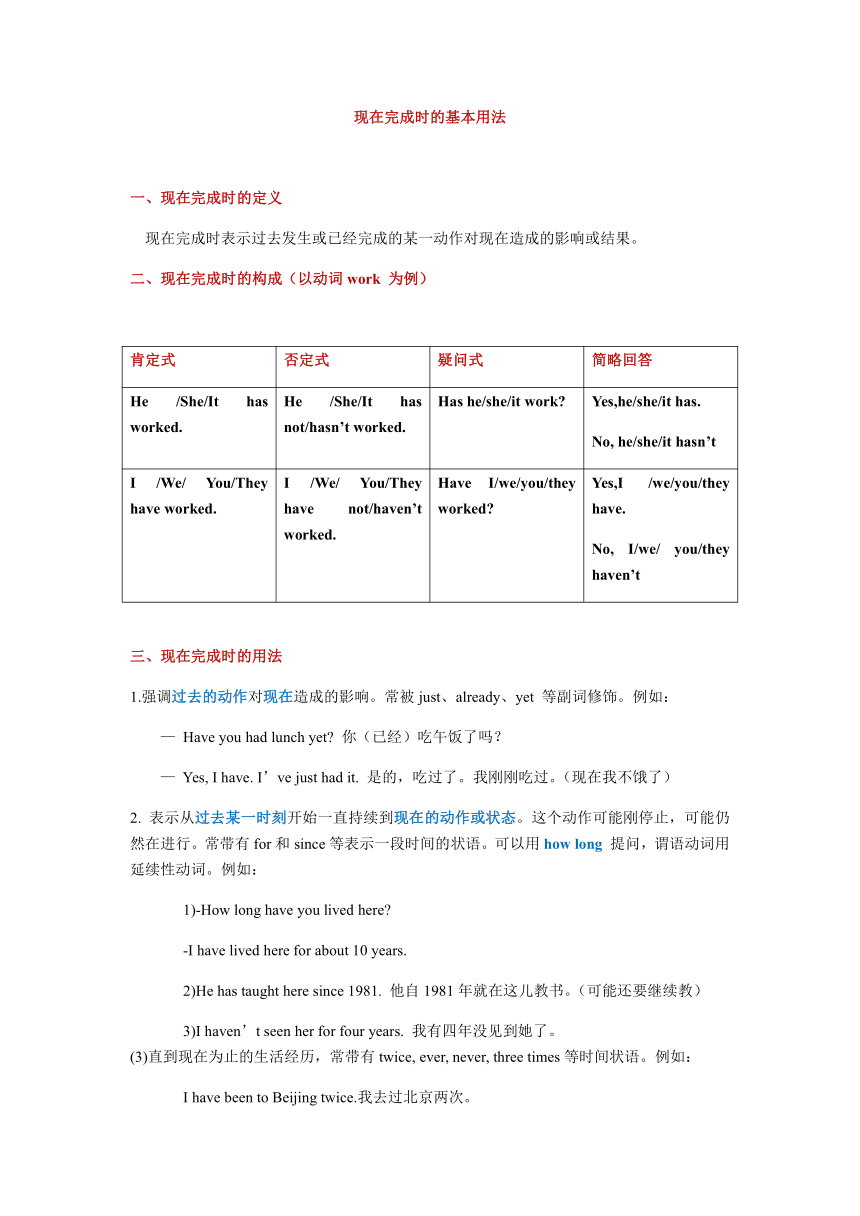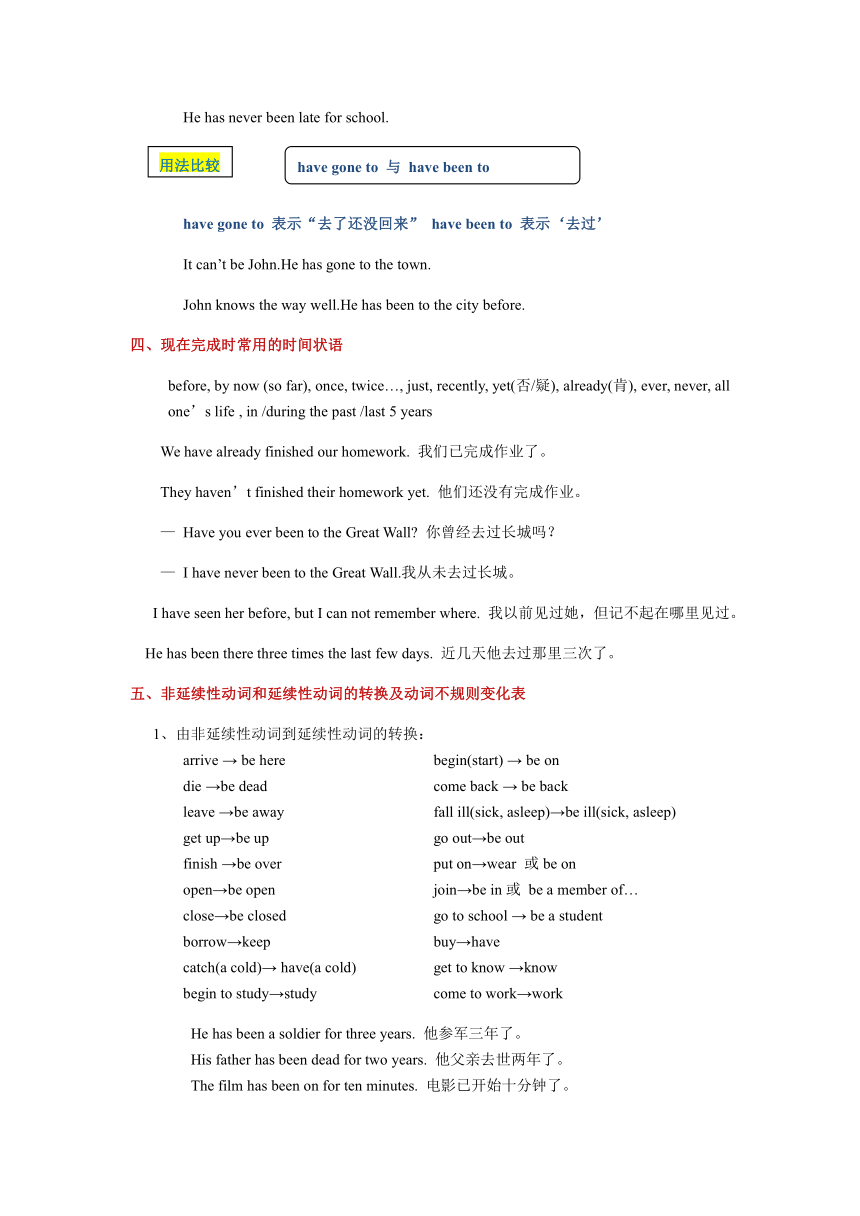译林版八年级英语下册Unit 3 Online tours现在完成时学案(含答案)
文档属性
| 名称 | 译林版八年级英语下册Unit 3 Online tours现在完成时学案(含答案) |  | |
| 格式 | zip | ||
| 文件大小 | 52.0KB | ||
| 资源类型 | 教案 | ||
| 版本资源 | 牛津译林版 | ||
| 科目 | 英语 | ||
| 更新时间 | 2020-04-05 17:37:40 | ||
图片预览



文档简介
现在完成时的基本用法
一、现在完成时的定义
现在完成时表示过去发生或已经完成的某一动作对现在造成的影响或结果。
二、现在完成时的构成(以动词work 为例)
肯定式 否定式 疑问式 简略回答
He /She/It has worked. He /She/It has not/hasn’t worked. Has he/she/it work? Yes,he/she/it has.No, he/she/it hasn’t
I /We/ You/They have worked. I /We/ You/They have not/haven’t worked. Have I/we/you/they worked? Yes,I /we/you/they have.No, I/we/ you/they haven’t
三、现在完成时的用法
1.强调过去的动作对现在造成的影响。常被just、already、yet 等副词修饰。例如:
— Have you had lunch yet? 你(已经)吃午饭了吗?
— Yes, I have. I’ve just had it. 是的,吃过了。我刚刚吃过。(现在我不饿了)
2. 表示从过去某一时刻开始一直持续到现在的动作或状态。这个动作可能刚停止,可能仍然在进行。常带有for和since等表示一段时间的状语。可以用how long 提问,谓语动词用延续性动词。例如:
1)-How long have you lived here?
-I have lived here for about 10 years.
2)He has taught here since 1981. 他自1981年就在这儿教书。(可能还要继续教)
3)I haven’t seen her for four years. 我有四年没见到她了。
(3)直到现在为止的生活经历,常带有twice, ever, never, three times等时间状语。例如:
I have been to Beijing twice.我去过北京两次。
He has never been late for school.
have gone to 表示“去了还没回来” have been to 表示‘去过’
It can’t be John.He has gone to the town.
John knows the way well.He has been to the city before.
四、现在完成时常用的时间状语
before, by now (so far), once, twice…, just, recently, yet(否/疑), already(肯), ever, never, all one’s life , in /during the past /last 5 years
We have already finished our homework. 我们已完成作业了。
They haven’t finished their homework yet. 他们还没有完成作业。
— Have you ever been to the Great Wall? 你曾经去过长城吗?
— I have never been to the Great Wall.我从未去过长城。
I have seen her before, but I can not remember where. 我以前见过她,但记不起在哪里见过。
He has been there three times the last few days. 近几天他去过那里三次了。
五、非延续性动词和延续性动词的转换及动词不规则变化表
1、由非延续性动词到延续性动词的转换:
arrive → be here begin(start) → be on
die →be dead come back → be back
leave →be away fall ill(sick, asleep)→be ill(sick, asleep)
get up→be up go out→be out
finish →be over put on→wear 或be on
open→be open join→be in或 be a member of…
close→be closed go to school → be a student
borrow→keep buy→have
catch(a cold)→ have(a cold) get to know →know
begin to study→study come to work→work
He has been a soldier for three years. 他参军三年了。
His father has been dead for two years. 他父亲去世两年了。
The film has been on for ten minutes. 电影已开始十分钟了。
We have studied English for three years. 我们(开始)学英语已三年了。
2、 动词过去分词规则变化与不规则变化
(一) 规则变化
变化规则:与动词过去式规则相同。
1. 一般直接在词尾加上ed。look — looked
2. 以e结尾的动词,直接加d。move — moved
3. 以y结尾,y前面是辅音字母的动词,变y 为i,再加ed。carry — carried
4. 部分动词需双写尾字母,加ed。stop — stopped
(二)不规则变化表
原形 过去式 过去分词 中文
beat beat beaten 打败
ABC 型
原形 过去式 过去分词 中文
be was / were been 是,在…
begin began begun 开始
blow blew blown 吹
break broke broken 破裂、折断
AAA型
原形 过去式 过去分词 中文
cost cost cost 花费
cut cut cut 砍、切、割
hit hit hit 打、撞
ABA型
原形 过去式 过去分词 中文
become became become 成为
come came come 来
ABB型
原形 过去式 过去分词 中文
understand understood understood 理解、明白
bring brought brought 带来
build built built 建造
burn burned/burnt burned/burnt 燃烧
一、基础演练
1. Li Hong has ________ the army for 2 years.
A. joined B. be in C. been in D. joined in
2. We have been friends since ______.
A. children B. five years C. five years ago D. five years before
3. Mike ___________ the story for a month.
A. has bought B. has had C. had had D. has borrowed
4. You ______ that question three times.
A. already asked B. have already asked
C. already have asked D. asked already
5. Those foreign friends left Guangzhou __________.
A. since last week B. a week ago C. for a week D. since a week ago
6. I _____ at this school for two years.
A. am studying B. study C. studied D. have studied
7. They _________ in the city since last summer.
A. live B. didn’t live C. have lived D. live
8. Mrs. Wang has lived in Haikou _________ 1992.
A. since B. from C. after D. in
9. Mr. Black _________ China since the summer of 1998.
A. has been to B. has been in C. has come to D. came to
10. His father _______ for years.
A. has died B. has been dead C. died D. dies
二、句型转换
1. He has already gone home.
He _________ __________ home ____________. (否定句)
____________ he __________ home ___________? (一般疑问句)
2. He has lunch at home.
He __________ _____________ lunch at home. (否定句)
____________ he __________ lunch at home? (一般疑问句)
3. He has been there twice. (对划线部分提问)
_________ _______ ________ __________ he been there?
4. I have lunch at school. (对划线部分提问)
__________ __________ you ____________ lunch.
5. They have been here since 2000.
__________ __________ have they been here? (对划线部分提问)
6. This factory opened twenty years ago.(改为同义句)
This factory__________ __________ __________ for twenty years.
7. Miss Gao left an hour ago. (改为同义句)
Miss Gao ________ _______ ________ ________ an hour ago.
8. Her mother has been a Party member for three years. (改为同义句)
Her mother _______ the Party three years ________ .
9. The Green Family moved to France two years ago. (改为同义句)
_______ two years ________ the Green family moved to France.
10. The bus has arrived here. It arrived ten minutes ago. (把两个句子合并成一个句子)
___________________________________________
三、真题链接
1. --Where are the teachers now?
- In the meeting room. They _________ the meeting for 10 minutes. (2019.江苏淮安)
A. have begun B. have been on C. have had D. have been held
2. Our school life ________________ a lot since 2017. We have more activities now. (2019.北京)
A. changes B. changed C. will change D. has changed
3. —Jenny, your new tape player looks great.
—Oh, it’s not new. I _____it for three years. (2019广西玉林)
A. buy B. have had C. bought D. have bought
4. —Is everyone here, Jonathan?
—No. Sir. Millie is absent. She for two days. (2019南通江苏)
A. has fallen ill B. has been ill C. fell ill D. was ill
5. The shop in Wanda Square _______for six years, but I ______there so far. (2019呼和浩特)
A. has opened; haven’t gone B. has been opened ; haven’t been
C. has been open ; haven’t gone D. has been opened; haven’t been.
6. -The drama series The Thunder (破冰行动) hits screens these days. (2019江苏镇江)
-Oh. What a pity! I ____________ any of them yet,
A. doesn't watch B. didn't watch C. won't watch D. haven't watched
7. — Your new watch is so nice! When did you buy it? (2019四川眉山)
— In October. I it for two months.
A. had B. bought C. have had D. have bought
一、
1-5CCBBB 6-10 DCABB
二、
1. hasn’t gone; yet; Has; gone; yet 2. doesn’t have; Does; have 3. How many times has
4. Where do; have 5. How long 6. has been open 7. has been away since
8. joined; ago 9. It’s; since 10. The bus has been here for ten minutes.
三、
1-5BDBBB 6DC
用法比较
have gone to 与 have been to
